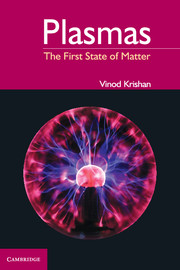1 - The Plasma Universe
Published online by Cambridge University Press: 05 June 2014
Summary
Plasma, a Matter of State
A plasma has always been described as the fourth state of matter, the other three being the solid, the liquid, and the gas. A solid transforms into a liquid by heating (ice into water); heating transforms a liquid into a gas (water into water vapor). When a gas is heated to a rather high temperature, the outermost electrons are detached from the gas atoms and the remaining part of the atoms, called ions, acquire positive electric charge. A mixture of the positively charged ions and the negatively charged electrons is formed. This mixture of a sufficiently large number of ions and electrons is called a plasma, a term borrowed from the blood plasma in which the red blood corpuscles and other organisms float. The name plasma for this ionized gas was first suggested by Irving Langmuir in 1939 while he was studying the electric discharges of gases by passing a high electric current through a gas of Cesium atoms.
But this is not how Nature did it!
Nature began with the plasma. Cooling of the plasma converted it into a gas. Cooling of the gas converted it into a liquid. Cooling of the liquid converted it into a solid.
Even though a plasma is not a result of a phase transition in the manner of ice-water-vapor, it is considered to be a state of matter because the characteristics of a plasma are significantly different from its parent neutral gas. A plasma, similar to a gas, has no definite shape or volume.
- Type
- Chapter
- Information
- PlasmasThe First State of Matter, pp. 1 - 40Publisher: Cambridge University PressPrint publication year: 2014



